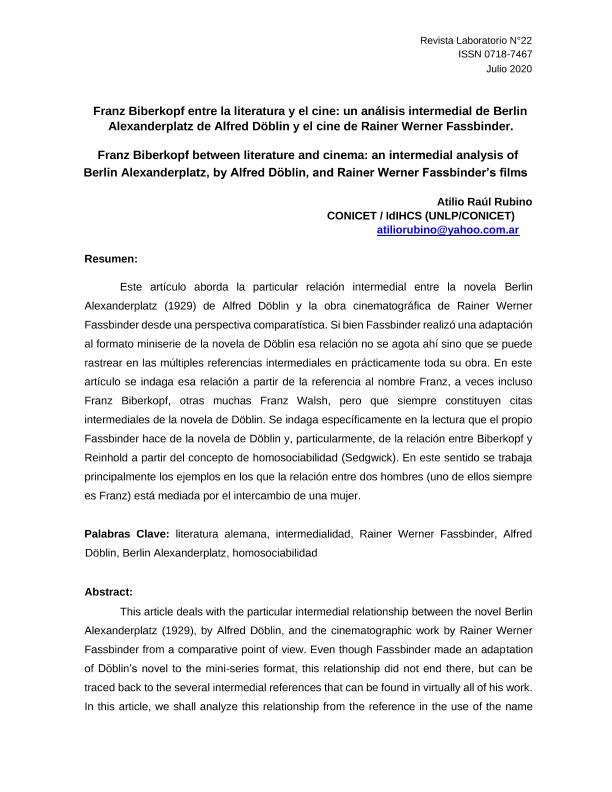Mostrar el registro sencillo del ítem
dc.contributor.author
Rubino, Atilio Raúl

dc.date.available
2022-04-12T19:49:13Z
dc.date.issued
2020-07
dc.identifier.citation
Rubino, Atilio Raúl; Franz Biberkopf entre la literatura y el cine: un análisis intermedial de Berlin Alexanderplatz de Alfred Döblin y el cine de Rainer Werner Fassbinder; Universidad Diego Portales. Facultad de Comunicación y Letras. Escuela de Literatura Creativa; LaboratoriO; 22; 7-2020; 1-15
dc.identifier.issn
0718-7467
dc.identifier.uri
http://hdl.handle.net/11336/155118
dc.description.abstract
Este artículo aborda la particular relación intermedial entre la novela Berlin Alexanderplatz (1929) de Alfred Döblin y la obra cinematográfica de Rainer Werner Fassbinder desde una perspectiva comparatística. Si bien Fassbinder realizó una adaptación al formato miniserie de la novela de Döblin esa relación no se agota ahí sino que se puede rastrear en las múltiples referencias intermediales en prácticamente toda su obra. En este artículo se indaga esa relación a partir de la referencia al nombre Franz, a veces incluso Franz Biberkopf, otras muchas Franz Walsh, pero que siempre constituyen citas intermediales de la novela de Döblin. Se indaga específicamente en la lectura que el propio Fassbinder hace de la novela de Döblin y, particularmente, de la relación entre Biberkopf y Reinhold a partir del concepto de homosociabilidad (Sedgwick). En este sentido se trabaja principalmente los ejemplos en los que la relación entre dos hombres (uno de ellos siempre es Franz) está mediada por el intercambio de una mujer.
dc.description.abstract
This article deals with the particular intermedial relationship between the novel Berlin Alexanderplatz (1929), by Alfred Döblin, and the cinematographic work by Rainer Werner Fassbinder from a comparative point of view. Even though Fassbinder made an adaptation of Döblin’s novel to the mini-series format, this relationship did not end there, but can be traced back to the several intermedial references that can be found in virtually all of his work. In this article, we shall analyze this relationship from the reference in the use of the name Franz – sometimes even Franz Biberkopf, many other times Franz Walsh –, which always works as an intermedial quotation of the novel by Döblin. We shall specifically study the reading that Fassbinder himself made of Döblin’s novel and, particularly, the relationship between Biberkopf and Reinhold from the concept of homosociability (Sedgwick). In this sense, we shall mainly work on the cases in which the relationship between two men (one of whom is always Franz) is mediated by (sexually) sharing a woman.
dc.format
application/pdf
dc.language.iso
spa
dc.publisher
Universidad Diego Portales. Facultad de Comunicación y Letras. Escuela de Literatura Creativa
dc.rights
info:eu-repo/semantics/openAccess
dc.rights.uri
https://creativecommons.org/licenses/by-sa/2.5/ar/
dc.subject
LITERATURA ALEMANA
dc.subject
INTERMEDIALIDAD
dc.subject
RAINER WERNER FASSBINDER
dc.subject
ALFRED DÖBLIN
dc.subject
BERLIN ALEXANDERPLATZ
dc.subject
HOMOSOCIABILIDAD
dc.subject.classification
Literaturas Específicas

dc.subject.classification
Lengua y Literatura

dc.subject.classification
HUMANIDADES

dc.title
Franz Biberkopf entre la literatura y el cine: un análisis intermedial de Berlin Alexanderplatz de Alfred Döblin y el cine de Rainer Werner Fassbinder
dc.title
Franz Biberkopf between literature and cinema: an intermedial analysis of Berlin Alexanderplatz, by Alfred Döblin, and Rainer Werner Fassbinder’s films
dc.type
info:eu-repo/semantics/article
dc.type
info:ar-repo/semantics/artículo
dc.type
info:eu-repo/semantics/publishedVersion
dc.date.updated
2021-10-12T15:55:10Z
dc.journal.number
22
dc.journal.pagination
1-15
dc.journal.pais
Chile

dc.journal.ciudad
Santiago de Chile
dc.description.fil
Fil: Rubino, Atilio Raúl. Consejo Nacional de Investigaciones Científicas y Técnicas. Centro Científico Tecnológico Conicet - La Plata. Instituto de Investigaciones en Humanidades y Ciencias Sociales. Universidad Nacional de La Plata. Facultad de Humanidades y Ciencias de la Educación. Instituto de Investigaciones en Humanidades y Ciencias Sociales; Argentina
dc.journal.title
LaboratoriO
dc.relation.alternativeid
info:eu-repo/semantics/altIdentifier/doi/http://dx.doi.org/10.32995/rl222020210
dc.relation.alternativeid
info:eu-repo/semantics/altIdentifier/url/https://revistalaboratorio.udp.cl/index.php/laboratorio/article/view/210
Archivos asociados
